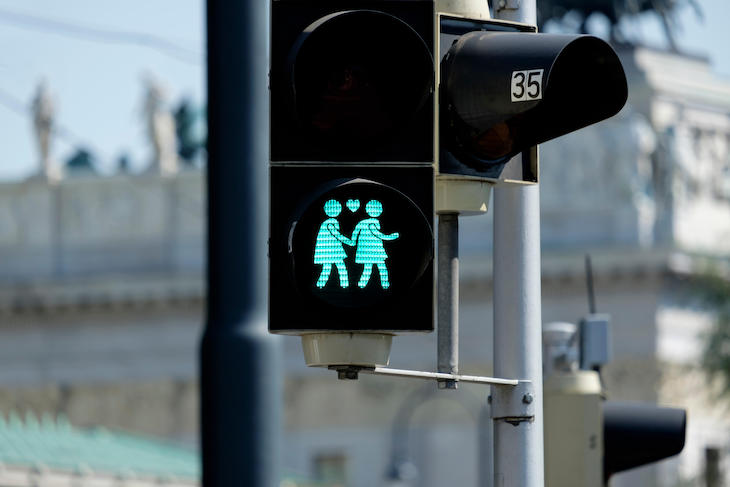Some lesbian and gay campaigners might have you believe that life is hard for gay people. Of course, for many it is. But my experience of being a lesbian is that it is mostly a privilege rather than an oppression. Lesbians can avoid the multiple disadvantages of navigating relationships with men, some of whom have absorbed messages of how they are superior to women. There’s another perk, too: what the Financial Times calls the ‘lesbian pay premium’. An analysis of studies from 1991 to 2018 found that lesbians typically earn 7 per cent more than their heterosexual counterparts.
The LGBTQ umbrella term can be suffocating for lesbians
That life is good for lesbians in Britain is not something we should take for granted. When I came out as a lesbian in 1977 at the age of 15 it wasn’t illegal for people to discriminate against me. I was bullied at school and nobody cared. Once I started work, I was fired from two jobs. I was beaten up and sexually assaulted, but the police did nothing. My girlfriend and I lost our flat when the landlord realised we were a couple. Back then, there was no recourse for me and the other lesbians I knew, all of whom had similar experiences.
Thanks to feminism and the lesbian and gay liberation movement, things are different now. When it comes to legislation, at least in the UK and a number of other democratic, Western nations, we are just about equal with heterosexuals.
Getting laws in place that would prevent direct discrimination was not easy, but it was well worth the effort. However, the reality of lesbian lives can be complicated. Even now, despite sometimes encountering ignorance and unpleasantness because of my sexuality, I have always believed I have major advantages due to avoiding relationships with men. The truth is that lesbians have far more opportunity to construct equal relationships.
However, the advantage for lesbians seems to be shrinking lately, despite progress in lesbian rights. The FT‘s Soumaya Keynes writes that the lesbian pay premium may be vanishing. Why is this?
The convergence with gay men, as well as the rest of the rainbow alliance, probably isn’t helping. Where once lesbians were able to carve out a unique identity, the LGBTQ umbrella term can be suffocating. It puts people who often have nothing in common in a group. Inevitably, when men and women are pooled together, it is women who end up losing out.
Of course, the rainbow alliance isn’t wholly to blame for this development. Advances in science mean that it is easier for lesbian couples to have children. This is a wonderful thing for those families, but the reality of having children also means that promotion and pay rises at work can become more elusive. However equal lesbian relationships might be, the motherhood penalty applies to both heterosexual and gay couples.
Perhaps there is also something else going on; out lesbians – such as those who agreed to take part in the studies about pay – might be more assertive and confident than some heterosexual women in the same job. This is likely to be for the simple reason that they have had to be tough to be out and proud. Employers may be less likely to mess with them; they might also assume that lesbians are ‘safer’ to promote because they are considered less likely to go on maternity leave.
The truth is that we can only really grasp at what is going on when it comes to establishing whether the lesbian pay premium does, or doesn’t, exist. Research on lesbians is difficult to ascertain, which is why the academic Kathleen Stock and I set up the Lesbian Project in 2022. What is clear though, is, thanks to the efforts of lesbian campaigners, life is a damn site better, good even, for those of us lucky enough to live in liberal enclaves, and supportive networks. Some issues continue to plague us, not least when lesbians are told that we are discriminating against trans-identified males if we don’t accept them in women-only spaces. But, even so, my 15-year-old self would have been delighted at the progress we have made.







Comments